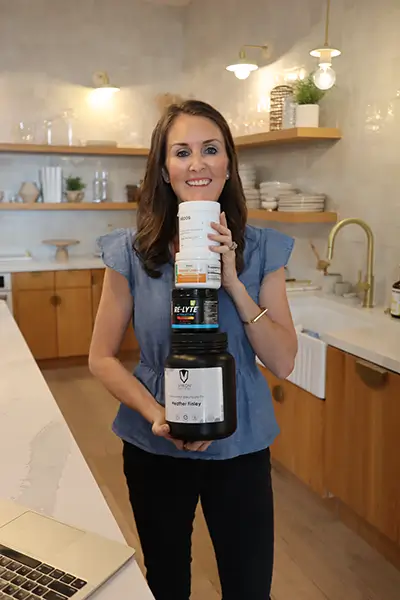Feeling like your stomach is stretched like a balloon by the end of the day can be frustrating, especially when it happens no matter what you eat. For some people, a bloated stomach can be linked to an underlying infection like H. pylori, especially if you are experiencing the “3 B’s: burping, bloating and burning”.
While avoiding certain foods might give you short-term relief, lasting change comes from understanding what’s really going on in your digestion and why this common infection could be part of the problem. H. pylori is actually the most common infection in the world, and one of its biggest effects is lowering stomach acid. When stomach acid is suppressed, food isn’t broken down properly, pathogens aren’t killed off the way they should be, and the rest of digestion gets thrown off. From bile flow to pancreatic enzyme output, everything downstream depends on that first step. This is why addressing H. pylori can make such a dramatic difference for a bloated stomach.
Why H. pylori Can Cause a Bloated Stomach
H. pylori is one of the most common infections in the world, and many people don’t realize they have it. It lives in the stomach lining and can suppress stomach acid production. Without enough stomach acid, proteins aren’t broken down properly, food sits in the stomach longer than it should, and that leads to fermentation, gas, and bloating.
Low stomach acid also means slower emptying of the stomach, which can cause constipation, discomfort, and more pressure in the belly.
Alongside bloating, H. pylori can also cause the “three B’s”: bloating, burning, and burping. You might also notice bad breath, discomfort after high-protein meals, or reflux. Left unaddressed, low stomach acid caused by H. pylori can affect the rest of your digestion, from bile flow to pancreatic enzyme production, and create a ripple effect of symptoms. Because digestion works north to south, when the very first step is disrupted, the entire system struggles to do its job.
How to Tell If H. pylori Might Be Behind Your Bloating
Bloating can show up in different patterns depending on what’s going on in your gut. If you tend to bloat after eating high-protein meals, notice it getting worse as the day goes on, or even wake up feeling puffy, H. pylori could be part of the picture. Other red flags include reflux, bad breath, chronic burping, and a history of digestive discomfort that doesn’t fully go away with diet changes.
Certain factors can make H. pylori more likely, including stress, low mineral status, poor meal hygiene, and other underlying gut infections. Because it’s easily passed through saliva, you can also pick it up from close contact with other people or even pets.
Simple Steps to Support Digestion While Addressing H. pylori
Even if H. pylori is part of what’s driving your symptoms, there are simple things you can do right now to ease the pressure on your digestion. These daily habits may feel basic, but they set the foundation for healing and can make a noticeable difference in how bloated you feel. The first step is one that’s easy to overlook: chewing your food.
Chew Your Food Thoroughly
Chewing 20 to 30 times per bite might sound simple, but it makes a big difference in digestion. This step stimulates stomach acid production and breaks down food so your stomach has less work to do. Your goal is to have food at a soft, mushy consistency before you swallow.
Use Digestive Bitters (With Caution)
Digestive bitters can help stimulate stomach acid and support digestion, but they should be used with care if you have any irritation in the stomach lining. Choose non-alcoholic bitters and consult with a practitioner before starting them, especially if you suspect or know you have H. pylori.
Support Bile Flow and Enzyme Output
Your gallbladder and pancreas depend on proper stomach acid levels to get their own digestive processes going. If H. pylori is lowering stomach acid, bile flow can become sluggish, and enzyme production can drop. This leads to undigested fats, burping after high-fat meals, or stools that float or look greasy. Staying hydrated or including teas to support digestive health, eating balanced meals that include healthy fats, and using gentle supports like castor oil packs over the liver area can help encourage better bile flow.
Activate Your Vagus Nerve
The vagus nerve connects your brain and gut, and activating it before eating can switch your body into rest and digest mode. Simple practices like deep breathing, humming, or gargling before meals can help your digestion run more smoothly. Even taking a few slow breaths before your first bite can make a noticeable difference.
When to Get Tested for H. pylori
If bloating is constant despite your best efforts with food and lifestyle, testing is the fastest way to get answers.
Stool testing can confirm whether H. pylori is present and reveal other factors contributing to your symptoms, such as dysbiosis or slow motility. Because H. pylori can be stubborn, working with a practitioner ensures you have a complete plan that addresses the infection without missing other important pieces of digestion.
The Path to Lasting Bloat Relief
A bloated stomach doesn’t have to be your normal.
If H. pylori is part of the problem, supporting stomach acid production, improving digestion from top to bottom, and addressing the infection properly can lead to long-term relief. Guessing your way through supplements or diet changes often means missing the real issue.
If your bloating hasn’t improved with diet tweaks or quick fixes, it’s time to look deeper. Our gutTogether program is designed for exactly this. You’ll get comprehensive one-on-one support with an experienced gut health dietitian, stool testing to uncover hidden infections like H. pylori, and custom protocols created specifically for your body. This isn’t a cookie-cutter approach, it’s a step-by-step plan that helps you finally address the root causes and start feeling like yourself again.
If you’re not quite ready to jump into full 1:1 support, the Gut Health Audit is a great place to begin. You’ll receive a personalized assessment with clear recommendations so you know exactly what’s driving your bloating and how to take the next step toward relief.








